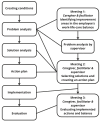Effects of a workplace participatory approach to support working caregivers in balancing work, private life and informal care: a randomized controlled trial
- PMID: 39841875
- PMCID: PMC12062804
- DOI: 10.5271/sjweh.4208
Effects of a workplace participatory approach to support working caregivers in balancing work, private life and informal care: a randomized controlled trial
Abstract
Objectives: Many employees combine their work with informal care responsibilities for family and friends, potentially impacting their well-being and sustained employability. This study aimed to investigate the effectiveness of a workplace participatory approach (PA) intervention in supporting working caregivers to prevent and solve problems related to balancing work, private life, and informal care tasks.
Methods: We conducted a two-armed randomized controlled trial (ISRCTN15363783) in which working caregivers either received the PA (N=57), under guidance of an occupational professional serving as process facilitator, or usual care (N=59). We recruited 125 working caregivers from four Dutch organizations. Questionnaire-based measurements were assessed at baseline, 4, and 7 months. The primary outcome was work-life imbalance. Secondary outcomes were perceived social support from supervisors and colleagues, role overload, distress and perceived burden of combining work and informal care. Intervention effects were analyzed using intention-to-treat analysis and linear mixed models.
Results: The PA was not effective in reducing work-life imbalance, improving support from colleagues or reducing role overload, distress and perceived burden of combining work and informal care. However, the PA significantly improved perceived social support from supervisors at 4 months [β=0.54, 95% confidence interval (CI) 0.21-0.88] and 7 months (β=0.36, 95% CI 0.02-0.70). Interaction effects indicated that improvement in supervisor support varied depending on the organization.
Conclusion: The PA improved supervisor support but not work-life imbalance. Further research should explore PA effects on working caregivers with and without balance issues and the role of supervisor support in reducing work-life conflict.
Conflict of interest statement
The authors declare no conflicts of interest.
Figures
References
-
- Eurostat. Reconciliation of work and family life - statistics. European Commission 2018. Available from: https://ec.europa.eu/eurostat/statistics-explained/index.php?title=Recon...
Publication types
MeSH terms
LinkOut - more resources
Full Text Sources
Medical



